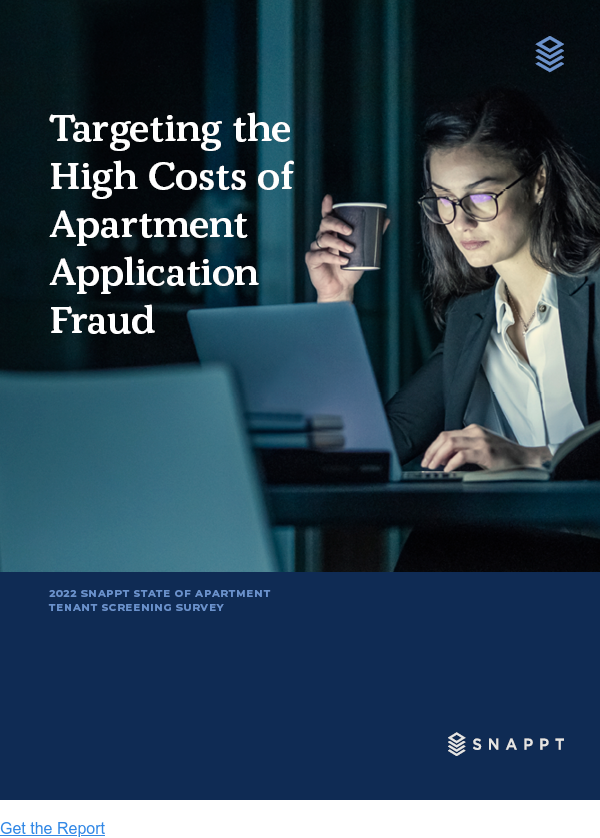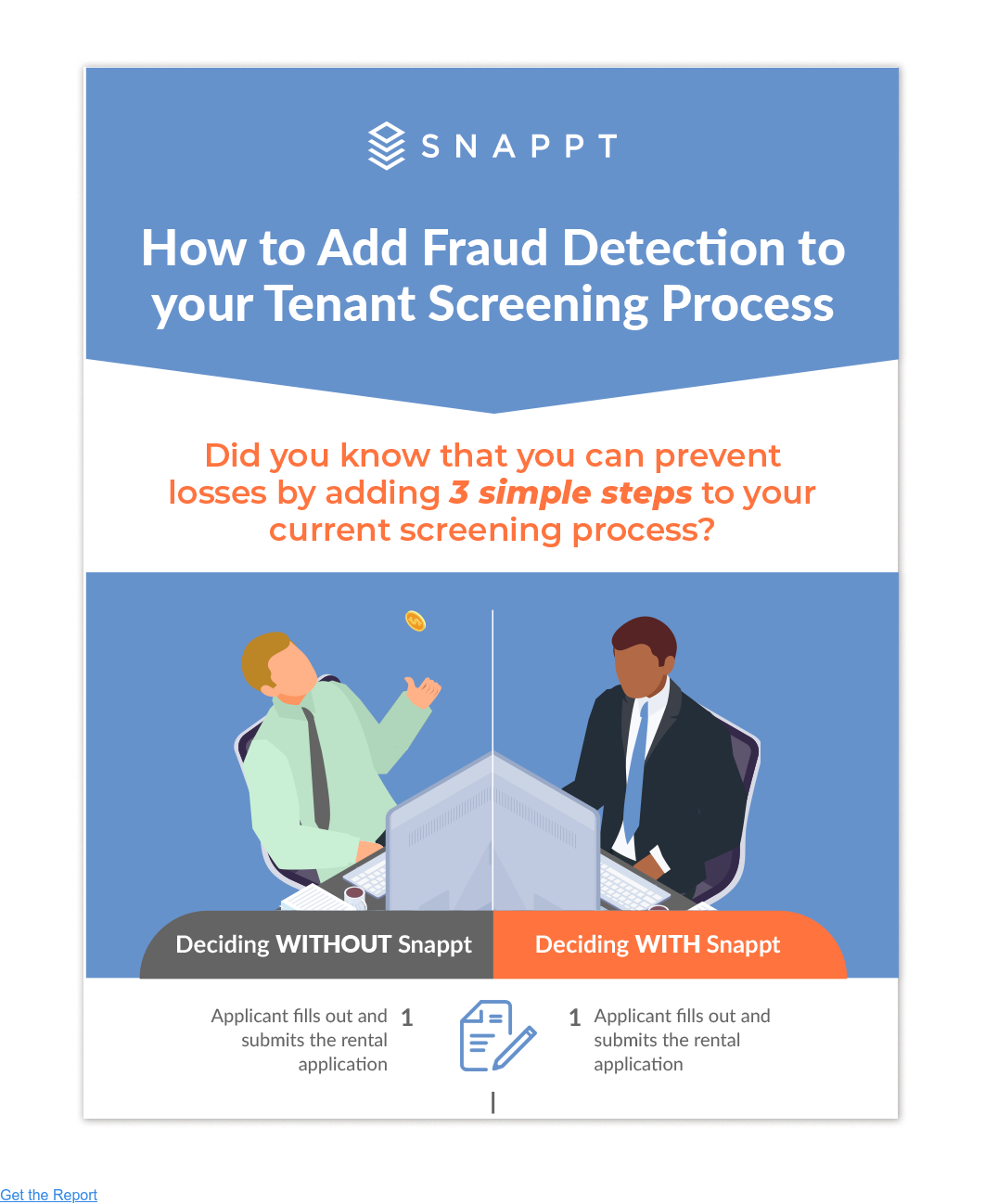Due to the coronavirus, a record 20.5 million jobs were lost in April, and the unemployment rate soared to 14.7%. According to CNN, Goldman Sachs now predicts that this rate is expected to peak at 25%, rivaling the worst period of the Great Depression. While out-of-work renters struggle to make their payments, landlords are wondering how to service an avalanche of debt and unpaid taxes. No matter where the unemployment peaks, economists have cautioned that it will take years, maybe even more than a decade, to get the jobless rate back near pre-crisis levels.
Desperate times call for desperate measures.
Unfortunately, many unemployed or underemployed individuals are resorting to financial documentation application fraud to obtain apartments they otherwise would not qualify for. Application fraud is rampant in the financial industry, but many property managers don't realize that it's widespread in the rental industry as well. In fact, a recent study by RezRez research found that one in three rental applications contains some form of fraud. And fraudsters are moving fast. They're leveraging advanced tools and employing sophisticated techniques for their fraudulent applications. While tenants are trying to maintain a roof over their heads, landlords must find ways to protect their assets.
What is rental application fraud?
In short, it is intentionally lying on a rental application. It is one thing to make a mistake or forget a detail, it's bound to happen from time to time, but clear misrepresentation on the rental application is fraud. And it's not just professional fraudsters taking advantage. The availability of photo editing software, high-quality digital cameras, and personal scanning devices is tempting even the average applicant to want to fib a bit here and increase their income a bit there. The intent is what makes this fraud, no matter how small it may seem.
Tenant screening has become even more complicated with social distancing. While online tenant screening tools can save properties in time and money by streamlining the application process, they also provide anonymity, which makes it easier than ever for individuals to commit application fraud.
Types of rental application fraud
To mitigate fraud risk in the rental portfolios, property managers must be aware of the main forms of fraud taking place. First-party fraud, third-party fraud, and synthetic identity fraud are categories of attack types that share a common goal but differ in methodology. Let's take a closer look.
First-party fraud
Tenant application fraud frequently falls into this category. First-party fraud is when the individual committing the fraud uses their own identity intending to commit the fraud. First-party fraudsters are most successful when they can blend in with good customers and perpetrate long-running scams undetected. In the case of first-party fraud, the fraudster is not misrepresenting who they are, but rather, they're deceptive about their information and intentions. For example, a first-party fraudster might apply for an apartment where they do not intend to pay rent or get a more expensive place than they can afford by lying about their financial situation.
Fake and altered financial documents are standard in this group. A basic search online for "Fake Pay stubs" results in the availability of these to the masses in minutes. In this scenario, applicants will alter or falsify pay stubs to verify employment or make it look like they make enough money to qualify. Some use the pay stubs from their actual jobs but change the numbers to look higher. If these applicants succeed, delinquent payments should be expected because they don't generate the income reported.
The combination of recent economic challenges due to the pandemic and the availability of high quality, affordable technology makes financial documentation fraud easy (and tempting) to even a non-criminally minded individual who may be in a negative financial situation.
Organizations have to understand that even if the risk appears to be low, the element of intent can mean the difference between choice tenants and severe losses.
Third-Party Fraud / True Identity Fraud
Third-party fraud differs from First Party Fraud in that what the fraudster misrepresents is who they are. Third-party fraud occurs when a malicious actor uses another person's information to open new accounts or take over existing ones, without the awareness of the individual whose data is being used. Fraudsters may obtain information such as a name, date of birth, or social security number to get a rental application approved. If the property management company is unable to flag these inaccuracies at the time of application, the fraudster may succeed in getting approved as a tenant while the victim is on the hook for an apartment they never applied for.
Third-party fraud is sometimes referred to as "true identity fraud," While the identity is stolen, it is lifted in complete form. The fraudster is impersonating a single, real individual. The increasing rate and scale of data breaches are fueling more third-party fraud than ever before. The anonymity of online applications means that this type of fraud is on the rise in the rental industry. How is a landlord going to manage a bad tenant if they don't even know who they are?
Synthetic ID Fraud
Synthetic ID fraud is the fastest-growing form of fraud today. Synthetic ID fraud is when applicants combine real and fake information to create an identity. This type of fraud is more sophisticated as Social Security numbers can be tricky for fraud offenders long-term because they are a government-issued entity and harder to falsify.
Synthetic fraud is increasing in popularity for advanced fraudsters in which the "applicant" is nothing more than a manufactured identity. These fraudulent identities are used during the rental application process. If approved, the fraudster gains access to an address to establish credit. While the fraudster runs up high balances or maxing out credit cards under this false identity, property managers are left with a resident who does not exist. As a result, property managers are unable to collect rent. As applicants continue to find ways to falsify SSNs, identification, and pay stub data, property managers need to find ways to identify this type of fraud before it's too late.
How property managers can mitigate risk from fraud
All types of fraud are difficult to detect. Savvy fraudsters have become progressively adept at disguising their intentions, falsifying documentation, and impersonating legitimacy. What property managers need is better technology so that they may flag fraud at the first warning sign. Fortunately, we have the technology today to successfully detect and prevent first, third, and synthetic identity fraud.
Technology-enabled tenant screening software combined with good-old-fashioned manual reviews are the secret sauce to getting it right. With a mission to deliver proactive financial documentation application fraud detection, Spirited has developed a fraud-detection solution that is affordable and integrates right into your existing tenant screening process. We invite you to request a no-pressure demo to see how it works for yourself.











